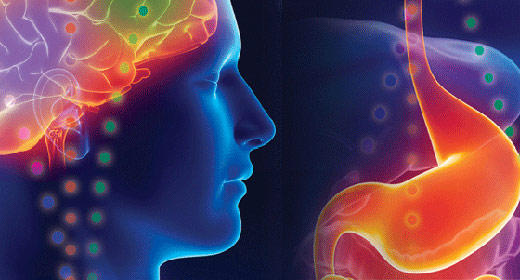 Posted October 29, 2014 | Nutrition & Health Tips
Posted October 29, 2014 | Nutrition & Health Tips
By Adriane Angarano, MS, CN
Gut-Brain Physiology
It has been said that the gut is our second brain. This “second brain”, also known as the enteric nervous system (ENS), is made up of a network of hundreds of millions of neurons that run the entire length of our gastrointestinal tract. These neurons transmit information back and forth from the GI tact and brain through electrical and chemical connections creating a complex system that is responsible for all aspects of digestion. From chewing to swallowing, from secreting enzymes to releasing neurotransmitters, from peristalsis (the movement of food through the GI Tract) to elimination, every action in your gut is linked to your brain.
Fun Exercise:
Next time you enter the kitchen or a restaurant and you smell something wonderful, notice the slight changes in your body- does your mouth start to water, does your stomach start to grumble with hunger, does your body have an overall sense of excitement and anticipation? Or maybe just sit for a moment and think about your most favorite meal, your body will have a similar physical response. So smelling or even thinking about food will cause automatic reactions such as the release of stomach acid and digestive enzymes to happen.
Did you also know that your digestive system alone has more neurons than your spinal cord? The majority of the ENS nerve fibers actually travel from the gut to the brain, not the other way around. And the gut produces 40% of the same neurotransmitters as the brain. Fascinatingly 95% of the body’s serotonin and 50% of the body’s dopamine are made directly in the gut! Hence our body’s “second brain”.
So how does this relate to the GAPS Diet?
According to Dr. Natasha Campbell-McBride, author of Gut and Psychology Syndrome, mental health problems are often examined by medical professionals from many angles: psychological, genetic, social, etc. The last place they investigate, if at all, is the functioning of the digestive system.
The health of the digestive system is known to play a major role in the health of the brain. Stress, anxiety, depression, and strong negative emotions decrease brain activity which decreases the overall function of the ENS, hence reducing the health of the digestive system. Likewise, since the majority of signals travel from the digestive system to the brain, the health of the gut has a direct impact on our behavior, emotions, mood, and other functions of the brain.
For a person with GAPS symptoms, their digestive system becomes a major source of toxicity to the body. If there is any damage to the gut wall, for a variety of reasons including inflammation, infections, harmful food reactions, dysbiosis, etc., this protective barrier can become damaged and “leaky”. When the gut becomes leaky, things that aren’t supposed to cross this barrier actually do.
These “things” can be anything from microorganisms, pathogens, medications, undigested food particles, to waste products. Once through the barrier, they can trigger an immune response and/or travel through the blood stream to the brain. They can also trigger an inflammatory response. This leads to a release of inflammatory chemicals called cytokines that enter the blood stream and travel to the brain. With the brain is being exposed to various elements and inflammatory chemicals, the brain itself can become inflamed and damaged.
How can the GAPS Diet help?
The goal of the GAPS Diet is to heal the gut wall, reduce inflammation, improve digestion, and therefore heal the brain. With improved digestion, food is properly broken down and absorbed in the most healthy optimal way. Healing a “leaky” gut wall also ensures that the aforementioned elements do not enter the bloodstream and consequently the brain. With a healthy gut we will see a healthy brain.
To learn more about the GAPS Diet program at Vital Kids Medicine and to discuss if this approach may be appropriate for you or your child, check out: https://vitalkidsmedicine.com/gaps-diet/
To read more about neurotransmitters, check out our previous blog post: https://vitalkidsmedicine.com/serotonin-gut-and-brain-connection/
This Post Has 0 Comments